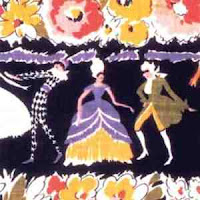My first book for Persephone reading week and it isn’t even a Persephone, but it was Persephone inspired so I’m counting it in. I read Duff Cooper’s
‘Operation Heartbreak’ a couple of years ago so the details are vague now, but I remember finding it very moving – definitely one of the best ones for me so far (and looking very like it’s going to be reread this week). I found
‘The Man Who Never Was’ in a second hand shop in Shetland and bought it partly as a souvenir and also because of the
‘Operation Heartbreak’ connection – In my heart of hearts I didn’t think I’d ever get round to reading it.
Which really would have been my loss. In a nutshell in the spring of 1943 a corpse was launched off the Spanish coast with planted information which significantly helped the allied war effort.
‘Operation Heartbreak’ is an apt name for the Duff Cooper version, the nonfiction version of events is if anything more moving than the fictional account. Cooper who I’m guessing was in the know clearly felt the need to invent a back story for ‘Major Martin’, the sort of life which would make his eventual end make more sense. Ewen Montagu and his team did the same thing, but for slightly different reasons, although there’s still a sense that Major Martin needed to become a person to make what happened to his body acceptable to all those involved.
In my copy (penguin) there is a grainy old black and white photo of what I can only describe as the corpse being committed to the waves, sped on by all good hopes for its effectiveness. I kept returning to it – it’s a thoroughly haunting and deeply poignant image which made me as a reader dearly want a satisfying story for Major Martin too. The Major’s actual identity is still unknown (permission to use the body was granted on condition that its actual identity would never be known) which seems to kick into action a deep human need for a story. For the mission, operation mincemeat, to succeed every detail had to make sense so a life was created – a man who has a family, falls in love, is reckless with his money, is an excellent officer, and who enjoys a bit of nightlife.
A man we would all like, who seems to have become real to his creators (shades of Miss Hargreaves) and who having briefly sprung into being dies again to go to war. It raises so many questions for me that I’m surprised
‘Operation Heartbreak’ is the only fictional account to come out of the incident. Had mincemeat been a failure a lot of the pathos would be lost, but Operation Mincemeat was an outstanding success that saved hundreds (maybe thousands) of lives during the invasion of Sicily. Major William Martin of the Royal Marines was a hero even though he never existed; it’s quite a paradox for a Tuesday.
All of which should make it clear that this is a bit of quality writing (despite sometimes dry descriptions of army procedure and protocol) which has aged remarkably well. For any
‘Operation Heartbreak’ fans out there it’s more than worth tracking down, I see it from time to time in charity shops, and cheap copies are available on amazon, it’s also more than worth finding for its own sake.
Finally apologies for the awful picture - still struggling with technical difficulties...

















